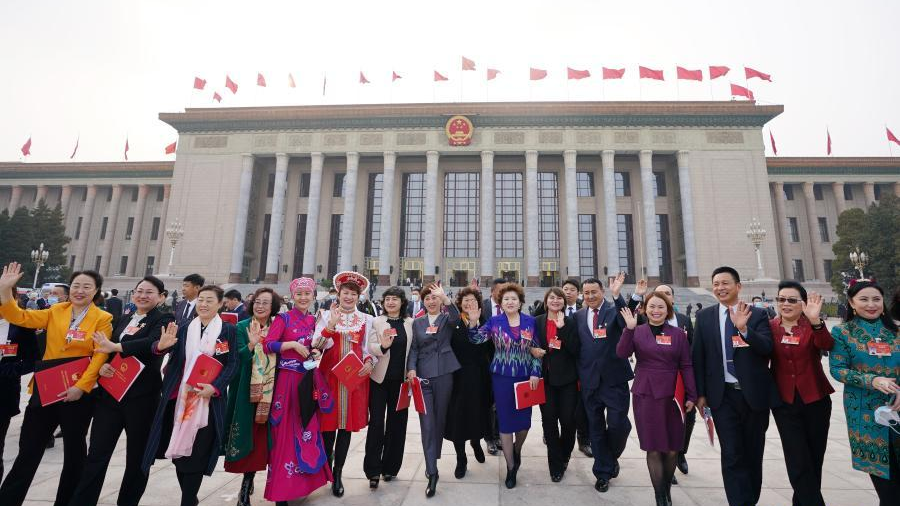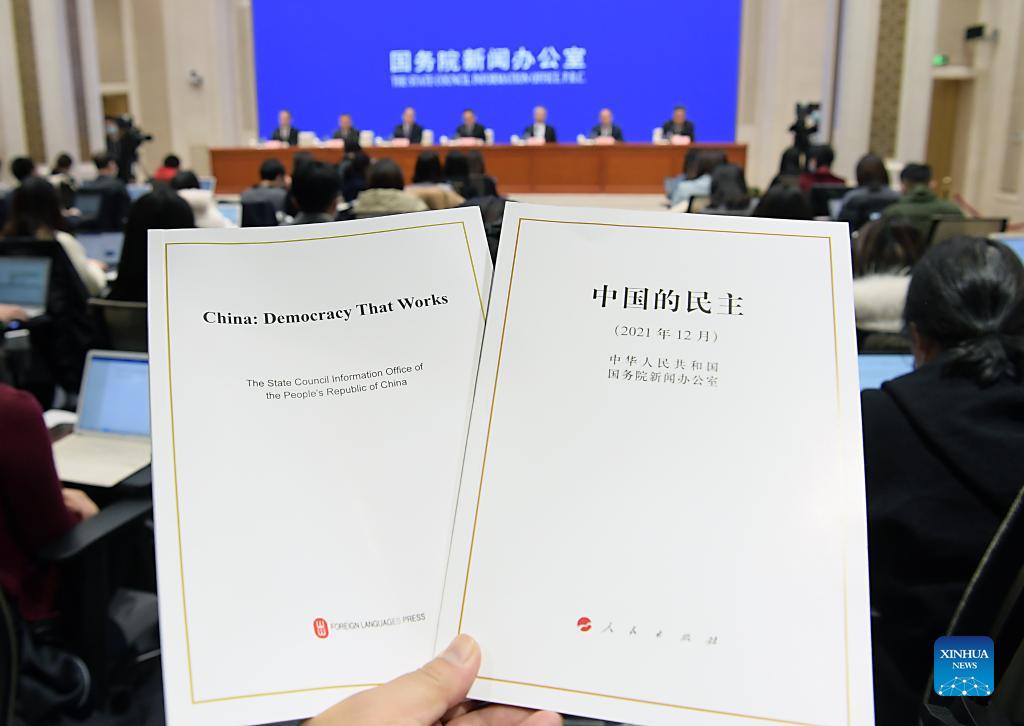
Deputies to the 13th National People's Congress (NPC) leave the Great Hall of the People after the closing meeting of the fourth session of the 13th NPC in Beijing, capital of China, March 11, 2021. /Xinhua
Deputies to the 13th National People's Congress (NPC) leave the Great Hall of the People after the closing meeting of the fourth session of the 13th NPC in Beijing, capital of China, March 11, 2021. /Xinhua
Editor's note: Wang Yiwei is vice president of the Academy of Xi Jinping Thought on Socialism with Chinese Characteristics for a New Era, research fellow of the Platform for the Study of Contemporary Political Parties, and Jean Monnet chair professor at the Renmin University of China. This is the first piece of our "China's view of democracy" series. The article reflects the author's opinions and not necessarily the views of CGTN.
Ancient Chinese civilization believes that man and nature are not in a contractual relationship, and that there is no need to draw clear lines between different roles such as nature, gods, king, aristocrat, government and the people; there are gods under heaven and they love each other instead of fight each other. Ancient Chinese people have awe and respect for supernatural beings such as ghosts and gods, but oppose anyone deliberately mystifying themselves to do whatever they want without accountability. The ultimate goal is to achieve the unity between men and nature. On top of that, the Communist Party of China has taken a step further to stress the unity of the Party and the people: "The nation is composed of people, and people are all that matter to the nation," which transcends the modern political civilization based on the human-God contract.
The CPC transcends simple humanism with its tenet of putting people at the center. It has elevated the unity between man and nature in traditional Chinese culture to the unity of the Party and the people. In this process, it learned lessons from Western political civilization and turned them into practices that suit China's realities. Former U.S. President Abraham Lincoln once spoke of the government of the people, by the people, and for the people, which was summarized by Sun Yat-sen as "Three Principles of the People." The CPC went further by emphasizing that it's a party in the people (putting people at the center), before the people (a vanguard who bear the brunt), and after the people (a devoted servant who is the last to enjoy the benefit). Therefore, the CPC is unlike any traditional Western party, nowhere near partisan in the ancient Chinese sense. The CPC pursues fairness and justice, and advocates for people. So we must see China, the CPC, and the whole-process people's democracy through a people-centric lens featuring the unity of man and nature rather than the Western humanistic lens featuring a contract between God and man.
The world today is undergoing major changes unseen in a century. An important hallmark is the transition from so-called industrial civilization to digital and ecological civilization. In the digital civilization, blockchain and Internet of Things technology are promoting a distributed, segmented, decentralized and un-authoritative governance model. Artificial intelligence raises the question of whether men define machine, or machine defines men, or it goes both ways. This is why we need to put special emphasis on people-centeredness. Ecological civilization emphasizes sustainable development, so we need to focus on the sustainability of democracy. The combination of people-centered values and the whole process of democracy constitute the whole-process people's democracy.
Many people think that the whole-process people's democracy is to counter or surpass Western democracy. In fact, it is to restore the original state of democracy. Just as the common values of all mankind are inclusive of universal values, but do not oppose or deny universal values, it is a special case of reducing universal values back to Christian monotheism. The whole-process people's democracy has amplified the fact that Western democracy is just a special case of monotheistic democracy. Confucius once said, "The gentleman does not serve as a vessel," which emphasizes democracy is about the people taking charge as their own master, rather than letting big money take charge. The whole-process people's democracy is truly universal and inclusive, not the Western democracy trying to convert others in the name of universal value and regarding whoever unwilling to convert as "outliers." The whole-process people's democracy interprets the excellent Chinese traditional culture of "In teaching, there should be no distinction of classes" and "The whole world is one family." Corresponding with the current information society and a civilized era, based on the principles of diversification, miniaturization, decentralization, it would in the end overturn the six criteria, namely, standardization, specialization, integration, synchronization, irrationalism and centralization, emerging from the industrial civilization. It will inevitably free people from materialization so that people regain spiritual liberation.
By referring to Kant's analytical framework featuring the elements of rationality, legitimacy and purposefulness, we can better understand that the whole-process people's democracy is a new form of political civilization created by China.
The logic of the whole-process people's democracy's success, be it in rapid industrialization or the digital boom, stems from its combination of two factors: The universal principles of Marxism and the splendid Chinese traditional culture. This is demonstrated by China's great unity, people-centered political tenets and non-monotheism secular culture. China has mobilized the whole nation to concentrate resources and get big tasks done. Different development goals are being pursued in parallel rather than tandem. Rules are being made during development, which in turn can guide future development – a dialectical thinking paradigm followed by the government. For example, China has been pushing for the digital transformation of industries while promoting the formation and development of the digital sector. China's success is the best testament to the rationality of the whole-process people's democracy.

Photo shows the Chinese and English editions of the white paper titled "China: Democracy That Works" at a press conference held by the State Council Information Office in Beijing, capital of China, December 4, 2021. /Xinhua
Photo shows the Chinese and English editions of the white paper titled "China: Democracy That Works" at a press conference held by the State Council Information Office in Beijing, capital of China, December 4, 2021. /Xinhua
The whole-process people's democracy has strong legitimacy. The State Council Information Office published a white paper titled "China: Democracy That Works" on December 4, pointing out that the whole-process people's democracy integrates process-oriented democracy with results-oriented democracy, procedural democracy with substantive democracy, direct democracy with indirect democracy, and people's democracy with the will of the state. It is a model of socialist democracy that covers all aspects of the democratic process and all sectors of society. It is a true democracy that works. In a word, the legitimacy of democracy depends on democratic practice and is subject to the test of time and the judgment of the people. General Secretary Xi Jinping has said, "The time's question, we answer, and the people judge.”
The whole-process people's democracy has its purpose. Democracy in China takes the form of people's democracy. At the heart of China's democratic system lies the tenet that people are the masters of the country. The whole-process people's democracy emphasizes the organic unity of the CPC's leadership, people's sovereignty, and the rule of law.
Why is the leadership of the Party emphasized here? It's because democracy is a good thing, just as the market is a good thing, but the market itself cannot always function well on its own. Sometimes, the market may have negative externalities. So the question is how to regulate the market and create conditions for the market to work. Especially when the vast number of developing countries is at an early stage of industrialization, it is necessary for the government to concentrate resources. These countries are increasingly interested in China's development model featuring "effective government plus efficient market."
China's model of political governance highlights the importance of making democracy work better and making it a force for good. At the same time, efforts have been made to prevent it from being corrupted by capital, tech giants and blind beliefs in God. These are the areas where the CPC can provide leadership.
The CPC always represents the fundamental interests of the overwhelming majority of the people. It stands in solidarity with the people and shares weal and woe with the people. It has no special interests of its own, and never represents the interests of any interest group, any powerful group or any privileged class. Therefore, the Party's leadership ensures that everyone engaged in the whole-process people's democracy always keeps in mind the founding purpose of democracy – letting the people be the masters of their own country.
In short, democracy is the shared value of all mankind, not the universal value touted by the West. To understand democracy, one must look at it from the development of the political civilization of humanity and from a larger historical perspective. In modern times, the stories of democracy in developing countries have been either stolen or suppressed by the West in the name of anthropology and orientalism, so much so that Western scholars also recognize the Eastern origins of Western civilization. They also realize the Western democracy is make-believe, with many stories being fudged out of thin air. These underhanded actions have made democracy a Western patent in modern political history.
After the end of the Cold War, the West preached "the end of history." They stopped talking fabricated stories of Western liberal democracy and started to export democracy, causing democratic alienation in many parts of the world. Today, when we talk about the shared values of all mankind, we intend to show that it is the shared mission of all nations and peoples to tell true stories of democracy, stay true to the founding purpose of democracy, diversify the forms of human civilization, that is, the plurality rather than simply the diversity of democracy, and to explore new democratic models for human governance.
By looking at the democratic development in history, we can see that democracy is the crystallization of the political civilization of all humanity and transcends ideology. Democracy is pluralistic, not just diverse. Democracy is the shared value of all mankind, not the so-called universal value touted by the West. Democracy is endogenous, not exogenous. It has to suit national realities and time. This is just how human civilization evolves. The community with a shared future for mankind has created a new world of democracy for all people, where people are the masters of their own countries and different countries work together to promote democratic governance. It is bound to and is already bringing about the prosperity and development of democracy for mankind.
The whole-process people's democracy is not just for China, but for the digital and ecological civilization that all mankind is now looking to as well.
(If you want to contribute and have specific expertise, please contact us at opinions@cgtn.com.)

